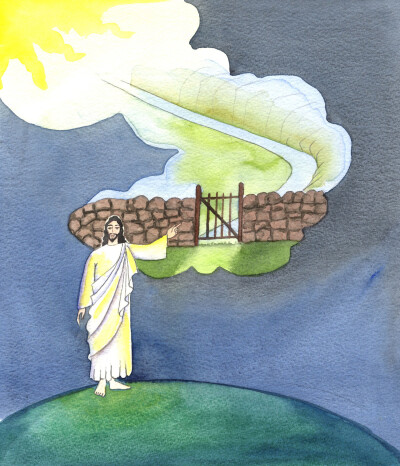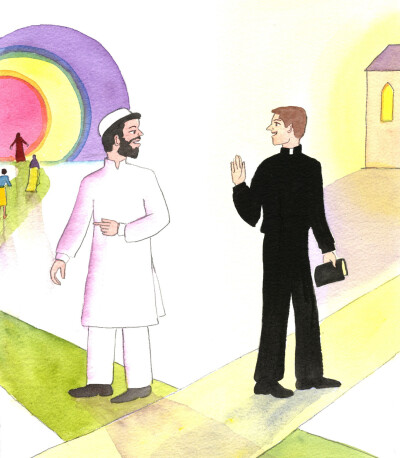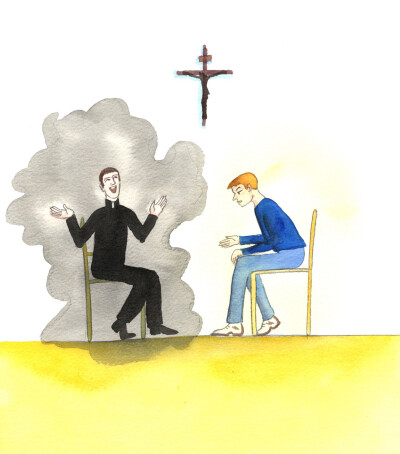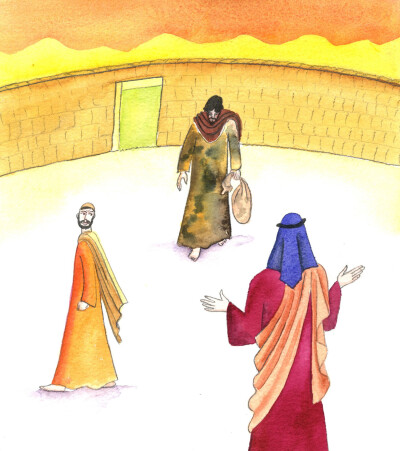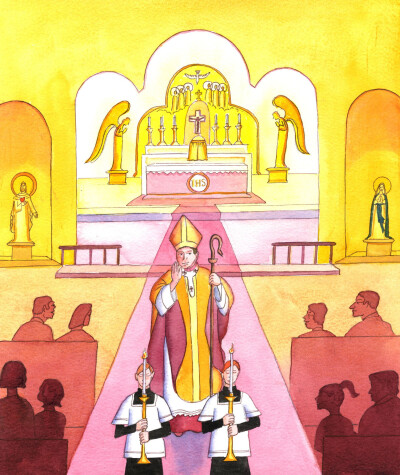Search Page
Showing 41 - 60 of 68
The Gospel brings joy, to those who repent and change. There are Catholics who believe that niceness is enough, and that mortal sins are unimportant. Jesus spoke the truth about sin and salvation when He said: "It is a narrow gate, and a hard road, that lead to life; and few there are that find it." It is important that we shun all temptations, and all 'occasions of sin'.
It might seem as if a viper has leaped out from his lair, to wound us. If we work for Christ, spreading the Gospel, we are going to be opposed, by people on earth and by Satan. We are wise if we recognise the truth, that harsh words or actions which cause us to suffer are caused by people acting from their sinful nature, as we sometimes do; so we forgive them, and turn to God for the courage to go on.
We must be faithful to the plain message of the Gospels, the Epistles, and the plain teaching of the Church through the ages. No Christian should take part in the worship of other religions, or make gestures that would be interpreted as being participation in such worship. God has shown us, through His Son, how to worship. We cannot abandon Christ and remain holy.
A priest has been ordained in order to preach the Gospel and to offer sacrifice, in order to rescue souls from their sins and lead them towards Heaven. So a priest who leads a soul towards Hell by suggesting his mortal sins are not serious, and that, in fact, someone can continue in his sins without any pangs of conscience, is a monster, in God's sight, because he is doing Satan's work.
Christ wants us to think carefully about 'environmentalism'. We are right to be concerned for people all over the world - to ensure clean water supplies, and reduced pollution, for example. It is a mistake, if we become concerned with the care of the planet almost to the point of excluding from our minds any interest in the state of our souls. The heart of the Gospel message concerns liberation from sin, and preparation for Eternal Life.
By humility we can advance in holiness. No matter what way of life we believe the Lord calls us to, we sometimes act like the man in Christ's Gospel story. We might assure Christ that we will obey Him, yet then walk away, or we might refuse to serve - then regret our decision, and come back, contrite, like the man who returned, as Christ said, to do his father's will. Whoever returns like this gives joy to Christ, and follows the right path.
Thousands of people flocked to see Jesus in Galilee, not only because He healed people; it was also because He was such a lovable person: wonderful to be near: helpful, kind and encouraging, as we can read in so many Gospel stories.
St Paul was full of fervour, and ideas about how to spread the Gospel; yet Christ guided Saint Paul in specific ways, showing him what places to go to and which to avoid, with marvellous results. Yet Christ cannot guide Catholics today, to do great works, if they are not willing to obey Him in everyday matters, including morals, and if they ignore or argue about the Church's teachings.
God is so good that He sent His own Son to suffer, to save us. Christ has warned us that we follow a 'hard road' to Heaven, and that few find it. People who have fallen into Hell have died unrepentant, having ignored God's laws, taken no notice of the Gospel, and having refused the help of wise friends who warned them of the danger of continuing in grave sin. And now they cry out in horror at their predicament, in the sea of fire in the depths of the Abyss.
Christ hears all sorts of prayers. Some people show their love for Christ by praying usually with very flowery language: very formal, or poetical or elegant. It springs from the traditions of their family or country. Others, brought up by plain-speaking parents, pray simple, honest, reverent prayers with no clever words but much love. We must not worry, about our simple prayers, since Christ said in the Gospel, 'Let your Yes be Yes and your No be No.' He likes our simplicity, just as He likes the beautiful words that other people offer, too.
There are millions of people in the world who have been deprived of knowledge, or opportunities for advancement, or freedom of various sorts, or the Gospel, living in poverty, or under atheistic governments, for example. Yet the internet is bringing a huge amount of knowledge to these millions, in an extraordinary manner. Though there are evil influences on the web, the Gospel is being told through it - and it is powerfully told, for example, through the pictures and teachings of 'Radiant Light'.
Through the Sacraments we receive Divine Life; and so the Lord wants everyone - especially every Catholic - to remember that a Catholic church is God's House: a place of holiness. It should therefore also be a place of reverence and dignity, worthy worship of God, and beauty, as well as having artworks that tell out the truth about the Gospel message or symbols, and God's plan of salvation. It is not a place for frivolity and silliness.
Holiness, by Elizabeth Wang
This text is the complete version of the pamphlet entitled 'SPEAK ABOUT HOLINESS'. It is based on a talk given by Elizabeth Wang.
Preface.
This little book contains the full version of the text I …
What is Mary Like? by Elizabeth Wang
This text is the complete version of the pamphlet WHAT IS MARY LIKE?
“Now having met together; they asked him, ‘Lord, has the time come? Are you going to restore the kingdom to Israel?’ He replied,…
The Purpose of the Priesthood, by Elizabeth Wang
‘The Purpose of the Priesthood contains encouragement and advice for Catholic priests. It reminds them about the central meaning of the Priesthood, and about the need to teach the Catholic Faith in it…
How to Pray: Preparation, by Elizabeth Wang
This text is published as Chapter 1 of How to Pray (Part One: Foundations), entitled 'How to Prepare'. An introduction to the life of prayer with much practical advice about how to deepen your prayer…
How to Pray: Perseverance, by Elizabeth Wang
This text is published as Chapter 3 of How to Pray (Part One: Foundations), pages 19-30, entitled 'How to Persevere'. An introduction to the life of prayer with much practical advice about how to deep…
How to Pray: The Mass, by Elizabeth Wang
This text is published as Chapter 4 and 5 of How to Pray (Part One: Foundations), pages 31-38, entitled 'How to Pray the Mass'. An introduction to the life of prayer with much practical advice about h…
How to Pray: Catholic Devotions
This text is published as Chapter 6 of How to Pray (Part One: Foundations). An introduction to the life of prayer with much practical advice about how to deepen your prayer life.
6 ABOUT CATHOLIC …
Autobiography of Elizabeth Wang, Part 1
This text forms part of Elizabeth Wang's Falling in Love: A Spiritual Autobiography (1999). It tells the story of her life and of her spiritual journey as she came to know Christ and His Church.
You …
Showing 41 - 60 of 68

